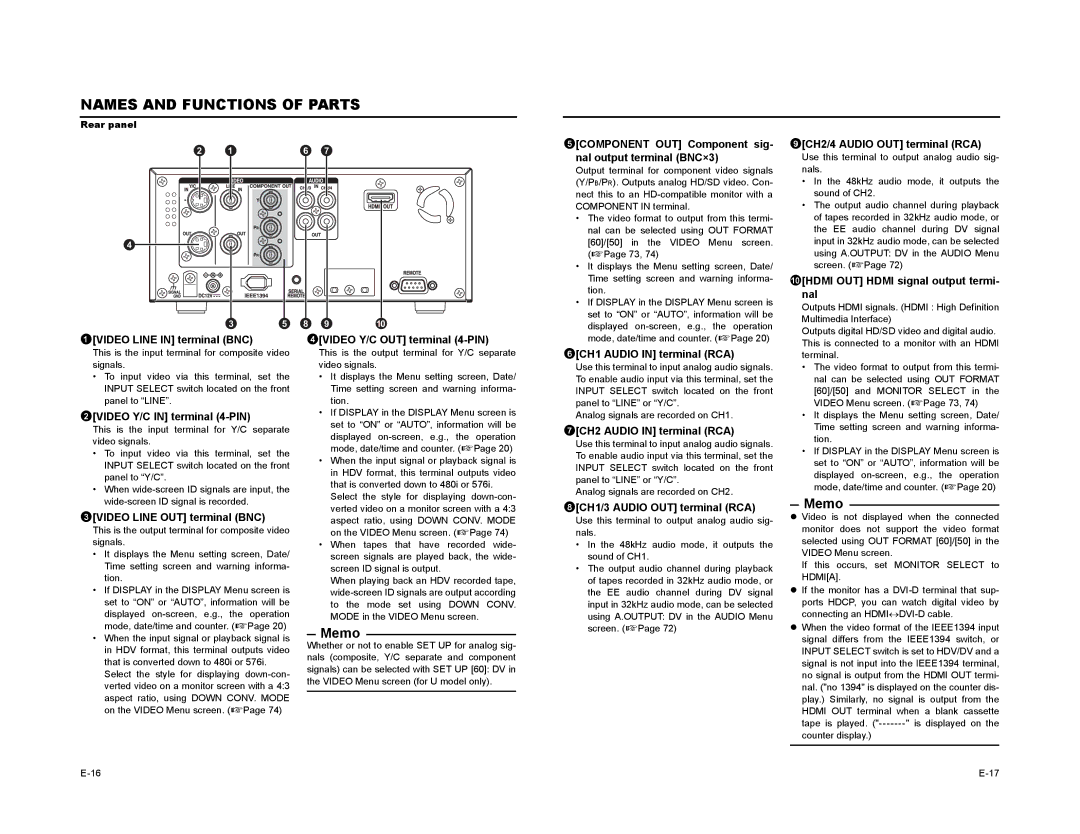
NAMES AND FUNCTIONS OF PARTS
Rear panel
2 | 1 | 6 | 7 |
|
4 |
|
|
|
|
| 3 | 5 8 | 9 | 0 |
1[VIDEO LINE IN] terminal (BNC) | 4[VIDEO Y/C OUT] terminal | |||
5[COMPONENT OUT] Component sig- nal output terminal (BNC×3)
Output terminal for component video signals (Y/PB/PR). Outputs analog HD/SD video. Con- nect this to an
•The video format to output from this termi- nal can be selected using OUT FORMAT [60]/[50] in the VIDEO Menu screen. (XPage 73, 74)
•It displays the Menu setting screen, Date/ Time setting screen and warning informa- tion.
•If DISPLAY in the DISPLAY Menu screen is set to “ON” or “AUTO”, information will be displayed
9[CH2/4 AUDIO OUT] terminal (RCA)
Use this terminal to output analog audio sig- nals.
•In the 48kHz audio mode, it outputs the sound of CH2.
•The output audio channel during playback of tapes recorded in 32kHz audio mode, or the EE audio channel during DV signal input in 32kHz audio mode, can be selected using A.OUTPUT: DV in the AUDIO Menu screen. (XPage 72)
0[HDMI OUT] HDMI signal output termi- nal
Outputs HDMI signals. (HDMI : High Definition Multimedia Interface)
Outputs digital HD/SD video and digital audio. This is connected to a monitor with an HDMI
This is the input terminal for composite video signals.
•To input video via this terminal, set the INPUT SELECT switch located on the front panel to “LINE”.
2[VIDEO Y/C IN] terminal (4-PIN)
This is the input terminal for Y/C separate video signals.
•To input video via this terminal, set the INPUT SELECT switch located on the front panel to “Y/C”.
•When
3[VIDEO LINE OUT] terminal (BNC)
This is the output terminal for composite video signals.
•It displays the Menu setting screen, Date/ Time setting screen and warning informa- tion.
•If DISPLAY in the DISPLAY Menu screen is set to “ON” or “AUTO”, information will be displayed
•When the input signal or playback signal is in HDV format, this terminal outputs video that is converted down to 480i or 576i.
Select the style for displaying
This is the output terminal for Y/C separate video signals.
•It displays the Menu setting screen, Date/ Time setting screen and warning informa- tion.
•If DISPLAY in the DISPLAY Menu screen is set to “ON” or “AUTO”, information will be displayed
•When the input signal or playback signal is in HDV format, this terminal outputs video that is converted down to 480i or 576i.
Select the style for displaying
•When tapes that have recorded wide- screen signals are played back, the wide- screen ID signal is output.
When playing back an HDV recorded tape,
Memo
Whether or not to enable SET UP for analog sig- nals (composite, Y/C separate and component signals) can be selected with SET UP [60]: DV in the VIDEO Menu screen (for U model only).
6[CH1 AUDIO IN] terminal (RCA)
Use this terminal to input analog audio signals. To enable audio input via this terminal, set the INPUT SELECT switch located on the front panel to “LINE” or “Y/C”.
Analog signals are recorded on CH1.
7[CH2 AUDIO IN] terminal (RCA)
Use this terminal to input analog audio signals. To enable audio input via this terminal, set the INPUT SELECT switch located on the front panel to “LINE” or “Y/C”.
Analog signals are recorded on CH2.
8[CH1/3 AUDIO OUT] terminal (RCA)
Use this terminal to output analog audio sig- nals.
•In the 48kHz audio mode, it outputs the sound of CH1.
•The output audio channel during playback of tapes recorded in 32kHz audio mode, or the EE audio channel during DV signal input in 32kHz audio mode, can be selected using A.OUTPUT: DV in the AUDIO Menu screen. (XPage 72)
terminal.
•The video format to output from this termi- nal can be selected using OUT FORMAT [60]/[50] and MONITOR SELECT in the VIDEO Menu screen. (XPage 73, 74)
•It displays the Menu setting screen, Date/ Time setting screen and warning informa- tion.
•If DISPLAY in the DISPLAY Menu screen is set to “ON” or “AUTO”, information will be displayed
Memo
zVideo is not displayed when the connected monitor does not support the video format selected using OUT FORMAT [60]/[50] in the VIDEO Menu screen.
If this occurs, set MONITOR SELECT to HDMI[A].
zIf the monitor has a
zWhen the video format of the IEEE1394 input signal differs from the IEEE1394 switch, or INPUT SELECT switch is set to HDV/DV and a signal is not input into the IEEE1394 terminal, no signal is output from the HDMI OUT termi- nal. ("no 1394" is displayed on the counter dis- play.) Similarly, no signal is output from the HDMI OUT terminal when a blank cassette tape is played.
